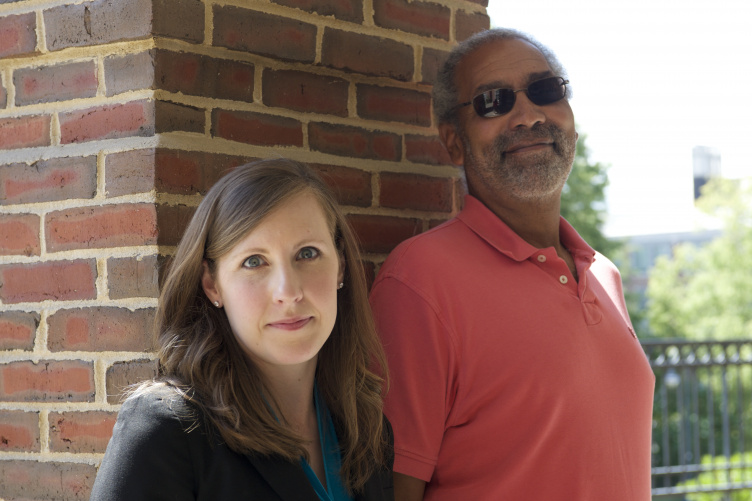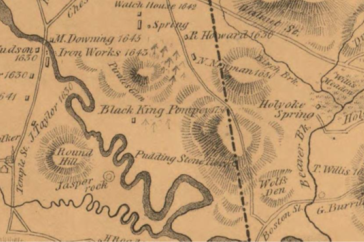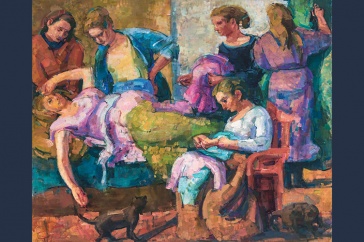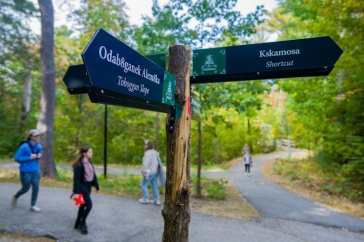
Tyler Jamison, assistant professor in the department of human development and family studies, and Vernon Carter, associate professor of social work.
This isn’t about the shooting of black men by police officers, or about Dallas and Baton Rouge. It’s about race and class and gender and equity in America, issues UNH professors have been discussing in classrooms for a while now, in some cases more than a decade. Current events serve as a reminder of just how crucial these discussions — and courses — are to society.
Race Matters (Women's Studies/COLA)
“Understanding history is very important, and drawing from what is taking place in this moment is a powerful way to make visible and concrete the concepts and theories I will present in my course,” says Jaime Nolan, who teaches Race Matters, a class that explores how racial categories in the United States shape identities.

community, equity and diversity
“There are historical patterns here, and unfortunately many in our society seem, as Richard Hofstadter wrote more than 50 years ago, to suffer a sense of historical amnesia bordering on historical and civic illiteracy,” Nolan says.
Implications of Race, Culture and Oppression for Social Work Practice (Social Work/CHHS)
Vernon Carter, associate professor of social work, teaches the "Implications of Race, Culture, and Oppression for Social Work Practice" course, designed to increase awareness related to the insidious nature of oppression.
Carter strives to help students recognize how they deal with classism and explore the kind of baggage they might, as social workers, bring to their work with clients. “Hopefully they will come to understand that who they are impacts how they perceive others,” Carter says.
One of the ways he gets to that is by asking students how they self-identify. The most common response? “I’m American.”
“When they say that, I push back until they acknowledge that somewhere along the line, they were immigrants. Often times it’s the first time they see ethnicity has impacted them. I’ll ask, ‘What do you have for Christmas dinner?' OK, meat pie because your family is Canadian. Well, if you’re not Canadian, you’re not having meat pie. If you’re not Italian, you’re not having spaghetti. So no, you’re not just American.”
Carter adds, “My goal is to get them to see who they are, how they are. I want them to look at themselves and acknowledge the differences. Racism in particular is rooted in our national way of being. Members of the dominant race are advantaged whether they want to be or not. Others are disadvantaged. Racism and all of the other isms are systemic. We are socialized from birth to believe we are superior and the other is inferior. Often we are unconscious of our unearned privileges related to race, gender, sexual orientation … but they’re there.”
“I want them to look at themselves and acknowledge the differences."
Race, Class, Gender and Families (Human Development and Family Studies/CHHS)
In Tyler Jamison’s "Race, Class, Gender & Families" course, students look at how those issues influence family life and the challenges they present in contemporary society. The assistant professor in the department of human development and family studies says police violence will be part of the conversation this semester in conjuncture with a component she teaches on incarceration.
“Students tend to be really surprised by the disproportionate number of black men who are incarcerated compared to white and Latino men,” Jamison says. An infographic she uses in class reveals that one in 106 white males over age 18 are incarcerated, compared to one in 36 Latinos and one in 15 black men “The effect of that on a family is profound. If your provider is in jail, what happens to your family? There is a disproportional effect on families of color, families with low income.”
Like Carter and Nolan, Jamison wants her students to gain increased self-awareness and understand how their race, gender and class shape their own lives.
“It can be so complicated,” Jamison says. “My initial approach is always, 'What do we know? What are the different components? What do we know about policing and what that means to a person of color? What do we know about racial disparity in traffic stops and violence?' Let’s start there. I tend to take the angle to help students understand dominant privilege so they will understand their own privilege and gain perspective on what it might be like not to have that.
“Practice is the word," she says. "We have three hours a week, and we practice. We practice talking about hard subjects.”
Why Race Matters
Nolan, associate vice president of community, equity and diversity, wants her students to “begin to see themselves in what is taking place and understand who they are in relationship to the world and what is and has been occurring in our country.”
“Given our current historical context, how does race not matter?” Nolan asks. “As a social, political and economic construction, race enters into every aspect of our lives and is present throughout the history of the west. In every western colonizing country, at some point, the rationale for conquest was/is racial superiority.
“We have to crack into and critically interrogate what the historian Ronald Takaki called the ‘master narrative of American history.’ There is a history here, and for any progress or true justice to occur, we have to critically interrogate that ‘common sense’ narrative.”
-
Written By:
Jody Record ’95 | Communications and Public Affairs | jody.record@unh.edu


















































